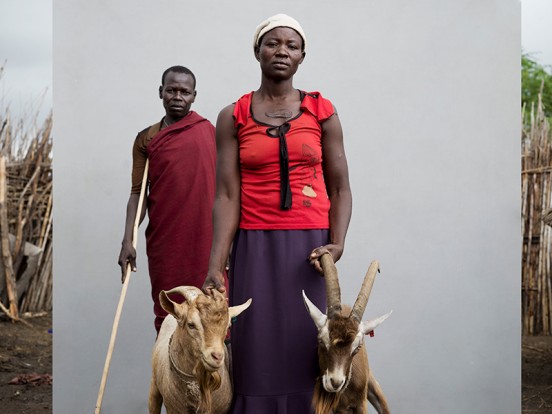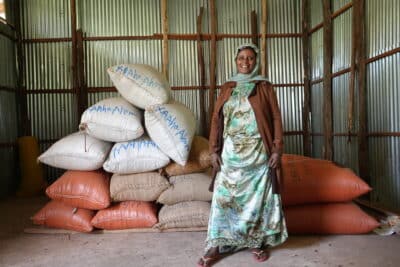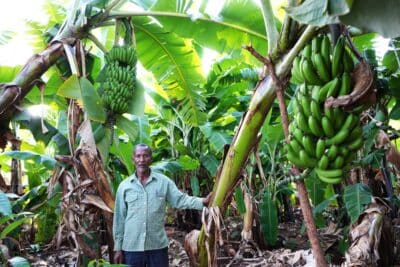News
7 May 2021
UK government ends funding for Livestock for Livelihoods

Last week, Farm Africa heard the devastating news that all UK government funding for our Livestock for Livelihoods project will cease in three months’ time, cutting short the project by eight months.
The project had been scheduled to run until the end of March 2022, but will now close early at the end of July 2021 as it is not feasible to continue without the UK aid funding, which accounted for the majority of the project’s costs.
The Livestock for Livelihoods project is helping over 10,000 Ugandan and Ethiopian pastoralist women set up sustainable, small-scale goat-rearing enterprises that improve nutrition amongst women and children and lift families out of poverty.
The withdrawal of funding by the UK government will leave 10,000 families living in two of the poorest areas in eastern Africa without support just when they need it most.
The Covid-19 pandemic has compounded many of the challenges facing agro-pastoral communities already struggling to get by in a harsh, unpredictable climate that can make it impossible to grow crops or keep cattle healthy.
The Livestock for Livelihoods project is currently funded by a UK government UK Aid Direct grant, along with funding from a number of other donors.
UK Aid Direct currently supports small and medium-sized civil society organisations to deliver the Global Goals, but as part of a series of cuts to the UK government’s aid budget, all UK Aid Direct grants are being terminated with three months’ notice. This will mean cuts to a wide range of projects aimed at strengthening global peace, security and governance; strengthening resilience and response to crisis; promoting global prosperity; tackling extreme poverty and helping the world’s most vulnerable, while delivering value for money for UK taxpayers.
Farm Africa CEO Dan Collison commented: “We are hugely disappointed to hear of the removal of UK government funding from the Livestock for Livelihoods project. This week, the UK government launched the G7 Girls’ Education Declaration, with a target of ensuring 40 million more girls in low and lower-middle-income countries attend school by 2026. The removal of funding from Livestock for Livelihoods is totally at odds with this target.
“Livestock for Livelihoods enables vulnerable mothers to earn money from rearing goats. For many of the women, this is the first money they have ever earned in their own right. We see time and again that when women’s incomes rise, their first priority is to invest in their families: in improving their children’s nutrition and paying for them to go to school. Withdrawing support from mothers means withdrawing support from their children too.”
The Livestock for Livelihoods project was featured in a photo gallery on the Guardian website, which told the stories of how the lives of women taking part in the project were being transformed.

Longoli Paska from Karamoja in Uganda (above), featured in the photo gallery, said:
“I am joyful to have goats. It used to be only men in my family who owned animals. I am happy that Farm Africa gave me the right to own goats myself. The project has enabled me to send two of my daughters to school: I borrow money from the savings group to pay their fees. I hope my daughters will have a different life to mine. I didn’t go to school myself.”
Since the Livestock for Livelihoods project was launched in 2018, it has been able to achieve significant impact.
The average income from goats of households participating in the project in Uganda increased from $9 in 2019 to $25 in 2020, to an average $45 in 2021. In Uganda, the average score for women’s economic empowerment has reached 75%, up from 54% in 2018. A household survey of project participants in Ethiopia in 2020 showed half of children under five years old were now drinking goats’ milk, compared to 12% in 2018.
While the cancellation of project activities planned for the remainder of 2021 and 2022 will lessen the project’s potential impact, Farm Africa is proud of the achievements to date, and has generated insightful learning that can be used in the design of future livestock projects.
We are grateful to all the donors who have supported this project. We are working hard to maximise the effectiveness of those funds in sustainably reducing poverty, improving nutrition and improving gender equality during the project’s final three months of operation.
Photos: Chris de Bode / Panos Pictures for Farm Africa




